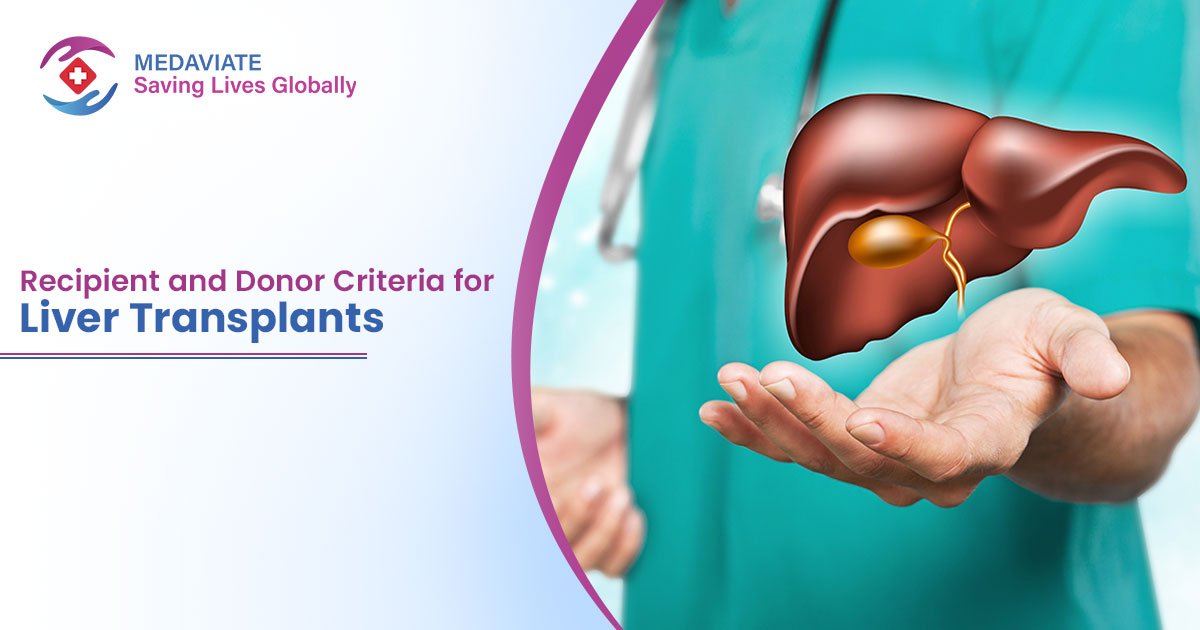- +91-97110 81535
- contact@medaviate.com
- Appointment

Recipient and Donor Criteria for Liver Transplants
For individuals suffering from acute liver failure or end-stage liver disease, liver transplantation can be a life-saving treatment. Determining the right recipient and donor is crucial for the success of the transplant. In this blog, we’ll explore the criteria for liver transplant recipients and donors as mentioned by the Best Hospitals for Liver Surgery in India.
Recipient Criteria for Liver Transplant
A liver transplant recipient must meet specific medical and non-medical criteria to qualify for the procedure. The primary medical conditions considered for liver transplantation include:
- Chronic Liver Disease: Conditions such as cirrhosis, which can be caused by hepatitis B or C, alcohol abuse, or non-alcoholic fatty liver disease, often necessitate a liver transplant.
- Acute Liver Failure: Sudden and severe liver failure due to viral hepatitis, drug toxicity (e.g., acetaminophen overdose), or other causes may require immediate transplantation.
- Liver Cancer: Patients with primary liver cancer (hepatocellular carcinoma) that has not spread outside the liver may be eligible for a transplant.
- Genetic Disorders: Diseases like Wilson’s disease or hemochromatosis, which affect liver function, may also lead to the need for a transplant.
Non-medical criteria include:
- Age: Generally, recipients are between 18 and 65 years old, though exceptions can be made.
- Psychosocial Factors: Patients must demonstrate the ability to adhere to post-transplant care, including medication regimens and follow-up appointments.
- Absence of Contraindications: Severe infections, active substance abuse, or certain cancers outside the liver may disqualify a patient from receiving a transplant.
Donor Criteria for Liver Transplant
Liver donors can be deceased or living individuals, and both types have specific criteria.
Deceased Donors
- Age: Typically between 18 and 60 years old.
- Cause of Death: Brain death due to trauma, stroke, or other causes.
- Health Status: The liver must be healthy without any signs of chronic disease or infection.
Living Donors
- Age: Usually in the age range of 18 to 55.
- Health: Donors must be in excellent health with no liver disease, cancer, or other significant medical conditions.
- Blood Type Compatibility: The donor’s blood type must be compatible with the recipient’s.
- Liver Size and Function: The donor’s liver must be of appropriate size and function to support both the donor and the recipient after surgery.
- Voluntary Consent: The donor must willingly consent to the procedure without any coercion.
Medaviate | Facilitating healthcare
Medaviate is a renowned healthcare facilitator that prioritizes consultation with top liver surgery hospitals and doctors in India. We provide comprehensive support for liver transplant patients, ensuring a seamless experience from evaluation to post-transplant care. Here’s how Medaviate assists patients.
Priority Consultation: Medaviate arranges timely consultations with leading liver surgeons and hospitals in India, ensuring patients receive the best possible care.
Travel and Accommodation Assistance: We manage travel logistics and secure comfortable accommodations for patients and their families, making the process stress-free.
Personal Assistant: Each patient is assigned a personal assistant to guide them through every step, from pre-transplant evaluations to post-operative care.
In conclusion, liver transplantation involves stringent criteria for both recipients and donors to ensure the best outcomes. With the support of Medaviate and access to the Best Hospitals for Liver Surgery in India, patients can navigate this complex process with confidence and receive the life-saving treatment they need.
